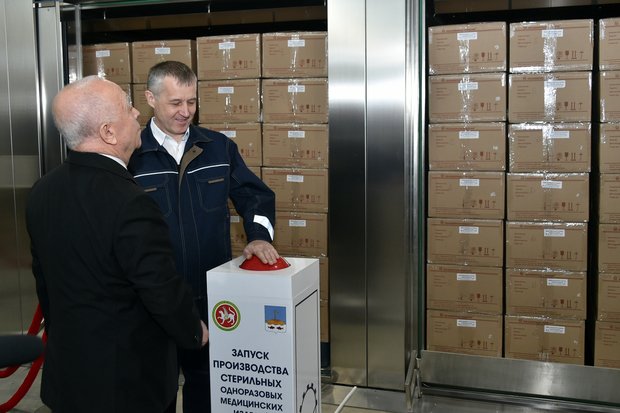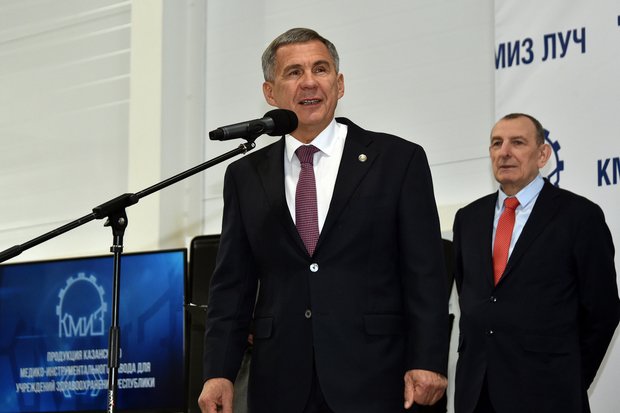Renat Akchurin, a heart surgeon: ''Some chase kickbacks, but their time is passing away''
The Kazan Medical Instruments Plant may launch its own production of syringe needles, which are imported at 3 billion rubles a year
''Some still chase kickbacks, but they do not know that their time is passing away,'' Renat Akchurin, a famous cardiac surgeon and RAS academician, advocated the domestic medical industry. He personally came to the opening ceremony of the largest sterilization centre KMIZ Luch, founded by his old partner and friend Nur Shakirov. Read the details in the report of Realnoe Vremya.
''One could get hepatitis in the Soviet times''
The famous surgeon has been ''launching the productions'' of new microsurgical instruments for complex vascular operations on the base of the Kazan Medical Instruments Plant (KMIZ) for almost 45 years. Recalling the history of his friendship with Nur Shakirov, Akchurin said that their acquaintance took place when creating an experimental sample of microsurgical instruments for re-attachment of arms, fingers and even legs, amputated in injuries. But the real authority among the surgeons KMIZ won when it started to produce the constructed by Akchurin clips and tweezers for operating cardiac arteries.
''It is impossible not to worry about the state of the Russian medical industry, which was lost in the late '90s. The healthcare has no future without connection with it,'' he shared his thoughts with journalists before the launching ceremony. According to him, there will be opened a medical production facility, which not only ''makes the investor's portfolios grow'', but also gives ''a strong weapon to save lives'' to the national healthcare. ''Previously, nurses boiled medical syringes before injections and tools before operations. But still, infections did take place, patients could get hepatitis,'' Akchurin recalls. ''But today here, in these chambers,'' he pointed to darkened sterilization units, ''disease carriers are 'burnt.''

From Moscow Oblast to Laishevo
The Kazan Medical Instruments Plant opened that day its own sterilization centre KMIZ Luch in the village of Kirbi, Laishevsky rayon. The entire range of disposable medical products and metal microsurgical kits of KMIZ will undergo the mandatory sterilization here. The plant manufactures products at 600 million rubles annually, but due to the lack of its own sterilization capacities, it had to restrain growth. As the head of the subsidiary company KMIZ Luch, Fanis Shamsetdinov, told the journalists, until today they had to ship products to the suburbs, Moscow Oblast, where there were delays in shipment.
According to Shamsetdinov, in the first place KMIZ complex invested 160 million rubles of its own funds and it is ready to spend the same amount for the second line in 2019. The Italian company DE LAMA has been chosen as the supplier of sterilization chambers, and the technology itself is based on ethylene oxide sterilization. ''Currently, there are installed two chambers with a capacity of 30 cubic metres per hour each, and another two will be purchased next year,'' Shamsetdinov revealed details of the project. With the opening of the sterilization centre, KMIZ has a free hand, and it will be able to annually increase the production of tools — from the volume of production by 0,8bn rubles in 2018 to 1,2bn in 2020.
The sterilization centre KMIZ Luch is loaded at 80-90%, but there is a niche for outsourced manufacturers. ''It is possible to sterilize 120 cubic metres per day here — it is a huge volume that will allow to provide not only Tatarstan and the Volga region, but also part of Russia,'' Renat Akchurin outlined the scale of the project.
Tatarstan President Rustam Minnikhanov, who attended the opening ceremony of the complex, made a rather curious remark for investors. He made it clear to the industrialists that additional production facilities should be taken outside Kazan. ''We believe that such projects (outside the city – editor's note) are very important, we should free Kazan from industrial production and to place production facilities in the neighborhood. The geographical location of this territory is very convenient, there is highway, airport, the city is nearby,'' the president of Tatarstan emphasized.

To pique China
The opening of the centre can give a cascade effect: KMIZ is cherishing the idea of opening a new production of syringe needles. As chairperson of the All-Russian public council of medical industry Yury Kalinin told Realnoe Vremya, now the country imports needles at 3bn rubles from Germany, Japan, Korea and China. This is almost 80% of the market. But if KMIZ finds a competitive scheme, outplays China by price, the project will be in the republic. According to him, now the country imports foreign medical equipment at 256bn rubles (including expensive tomographs), and only 20% is replaced by domestic analogues.